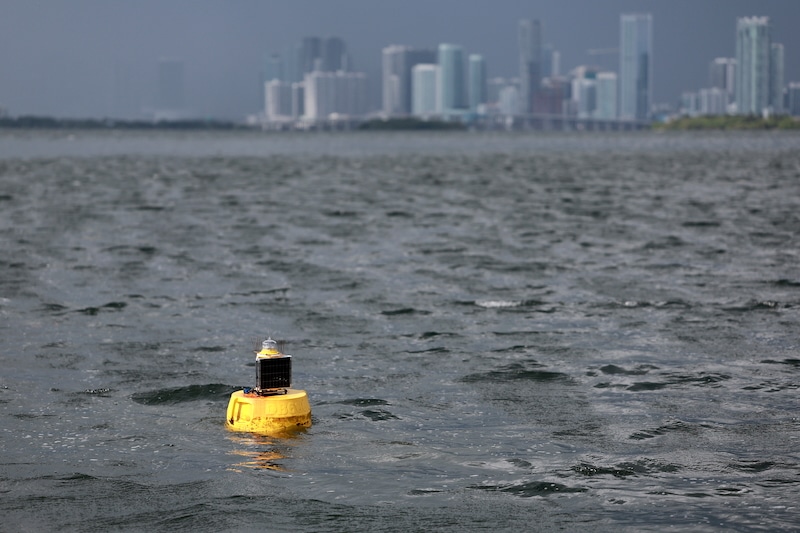
by Komoneed | Nov 10, 2024
A new study has found per- and polyfluoroalkyl substances (PFAS) in Miami’s rainwater. It is the most recent evidence that “forever chemicals” get caught up in the water cycle and circulate over great distances. “PFAS are practically everywhere,” said Natalia Soares Quinete, author of the study and an assistant professor of chemistry at Florida International […]
The post It’s Raining PFAS ‘Forever Chemicals’ in Miami, Study Finds appeared first on EcoWatch.

by Komoneed | Nov 10, 2024
Beyond Blueprints: Accelerate Implementation Now
jschoshinski
Thu, 11/07/2024 – 20:26
Under the Paris Agreement, countries devise blueprints for reducing greenhouse gas emissions and adapting to climate change called Nationally Determined Contributions (NDCs) and National Adaptation Plans (NAPs). Countries’ current commitments do not put the world on track to limit and avoid dangerous global warming but, at the same time, achieving the current goals in countries’ NDCs and NAPs is both difficult and complex. Supporting countries on their respective journeys—from more ambitious policy formulation and finance mobilization to investment promotion, implementation, and monitoring and evaluation—is foundational to achieving both country and global climate ambitions.
USAID’s Comprehensive Action for Climate Change Initiative (CACCI), led by Abt Global, was launched at COP26 with the goal of identifying promising mitigation and adaptation investment opportunities with private sector partners to help countries meet their climate commitments and strengthen their climate resilience. It provides support to countries by helping them increase policy ambitions and legislative directives for emissions reductions and address critical implementation barriers related to information, finance, technology, capacity, and regulations.
Over the past two years, CACCI has made progress on several fronts, including increasing climate policy ambition, mobilizing the private sector, enhancing accountability and transparency, and bridging the gap between intention and results. By creating a positive feedback loop between implementation success and greater ambition, countries see a realistic pathway to achieving their targets, making them more likely to commit to even more ambitious targets.
Increasing Climate Policy Ambition Through Foundational Target Setting
CACCI responds in tailored ways to direct requests from countries. For example, supporting higher-emitting countries, such as South Africa, takes a whole-of-economy approach in setting new emissions targets. CACCI is aiding South Africa’s Long-Term Low Emission Development Strategy (LT-LEDS) submission to the UN Framework Convention on Climate Change. The LT-LEDS provides a vision for achieving net-zero emissions by mid-century. It relies on evidence and modeling that informs the sectoral measures and investments for a whole-of-economy approach.
On the other hand, assisting lower-emitting countries, such as Jamaica, focuses on improving the enabling environment to support implementation. CACCI supports the Jamaican Ministry of Green Economy and Job Creation in developing climate change legislation, shaping the enabling environment for ambitious climate action. This includes setting the vision for decarbonization, establishing mandates for cross-sectoral coordination, clarifying institutional arrangements, and enabling private investment and finance for new technologies.
Mobilizing and Encouraging the Private Sector
Given the scale of the climate crisis, achieving climate goals requires significant private investments. CACCI collaborated with the Boston Consulting Group to create an investment impact framework to help investors articulate adaptation and resilience project bankability in terms of feasibility, resilience impact, co-benefits, and profitability. CACCI worked with Nigeria’s National Council on Climate Change, building investment cases for six projects valued at over $1.1 billion in the agriculture, water, and energy sectors.
Through the CACCI Partnership for Climate Action, private sector partners are articulating how their investments address climate change and support national climate agendas. For example, Genesis Energy is investing in renewable energy projects in Zambia to improve energy, health, and agriculture outcomes. Those projects include a hybrid solar and wind plant, solar electrification for healthcare facilities, and solar-powered cold chain storage to reduce post-harvest losses.
Enhancing Accountability and Transparency
Effective monitoring, evaluation, and learning mechanisms are essential for tracking and reporting progress, identifying gaps, and adjusting strategies and ambitions. Understanding actions at local, national, and regional levels is crucial for benchmarking progress and to meeting global commitments. CACCI is supporting the African Union Commission through the development of a digital Monitoring, Reporting, and Learning Dashboard, which offers a consistent framework for member states to report on NDC implementation progress.
Bridging the Gap Between Intention and Results
Despite the difficulty of meeting climate commitments, countries must take action to avoid the most catastrophic impacts of climate change. As countries put in place the building blocks of progress, it is important to act, not just plan. Taking action, however imperfect, is the best shot at bridging the gap between intention and results. CACCI will continue to meet countries where they are on their journeys, providing tailored support to implement current goals, increase policy ambitions, and enhance resilience to climate impacts.
Teaser Text
CACC was launched at COP26 with the goal of identifying promising mitigation and adaptation investment opportunities with private sector partners to help countries meet their climate commitments and strengthen their climate resilience.
Subtitle
Balancing the Need for Higher Ambition with Continued Progress Towards Countries’ Climate Change Commitments
Publish Date
Thu, 11/07/2024 – 12:00
Author(s)
Dr. Molly Hellmuth
John Heermans
Dr. Emily Weeks
Hero Image
Jeffreys Bay Wind Farm.jpg
Blog Type
Blog Post
Strategic Objective
Adaptation
Mitigation
Region
Global
Topic
Adaptation
Emissions
Low Emission Development
Climate
Climate Change Integration
Climate Finance
Climate Strategy
Climate Strategy Implementation
Mitigation
Monitoring, Evaluation, and Learning
Partnership
Private Sector Engagement
Resilience
Country
Nigeria
South Africa
Zambia
Sectors
Climate
Projects
USAID Comprehensive Action for Climate Change Initiative (CACCI)
Show Download Link
On

by Komoneed | Nov 10, 2024
This post was originally published on The Art NewspaperAhead of the announcement of the 2024 Film London Jarman Award winner on 25 November, Whitechapel gallery will show entries by all six shortlisted...

by Komoneed | Nov 10, 2024
Shifting Gears
jschoshinski
Fri, 11/08/2024 – 21:24
A busy intersection in Lahore, Pakistan stirs all of the senses, as motorcycles, auto rickshaws, and buses packed to the brim zoom by, leaving behind a trail of smog.
In this city, one-third of small particle pollution comes from vehicle emissions. Smog has become so prevalent in November that this time of year is referred to as “smog season,” as post-harvest crop residue burning worsens air quality.
Poor air quality has caused flight disruptions and road closures, as well as traffic accidents from bad visibility. It is the second-greatest threat to human health in Pakistan. Air pollution shortens lives by almost seven years in Lahore, and is responsible for 137,000 deaths per year in Pakistan as a whole. When the Pakistani Government determines that air quality constitutes a “smog emergency,” children have to wear masks to school and in some cases, the schools shut down entirely.
USAID and the Pakistani Government have acknowledged the critical need to tackle air pollution, recognizing its impact on millions of lives and the overall quality of life. In a strategic move, they are championing a solution that will achieve swift results — transitioning from gasoline vehicles to increasingly popular electric ones.
While vehicular emissions negatively affect human health, petroleum imports threaten economic stability. Due to surging global fuel prices in the aftermath of the COVID-19 pandemic and Russia’s invasion of Ukraine, a typical Pakistani household now devotes 30% of its monthly budget to buying gas for their vehicles. Switching to electric vehicles could save households money and reduce the country’s reliance on imported petroleum.
Here are three ways USAID has expanded the market for electric vehicles in Pakistan:
Image
At the Lahore University of Management and Sciences (LUMS), researchers spend time in the e-mobility R&D lab to help develop standards and policies for electric vehicles.
Photo Credit: Misbah uz Zaman Khan Asher for USAID
1. Developing policy and capacity
Before production of electric vehicles could begin, the Government of Pakistan needed to create standards and policies to support this new industry. USAID partnered with the Lahore University of Management Sciences (LUMS) and began working with the Government of Pakistan in 2017 to develop the framework for the country’s electric vehicle policy. In 2021, USAID and LUMS published a study on EVs and batteries that gave the private sector the information it needed to start investing in electric vehicles. This year, USAID collaborated with LUMS to create an e-mobility research and development (R&D) lab to innovate, create standards, and attract more private sector investment for the electric vehicle industry. USAID will continue to support Pakistan through a partnership with the National Renewable Energy Laboratory focused on deployment of charging stations and equipment standards for electric motorbikes and rickshaws.
Image
Startup ezBike offers to retrofit traditional petroleum motorbikes with electric vehicle technology.
Photo Credit: Misbah uz Zaman Khan Asher for USAID
2. Financing startups
In Pakistan, the lower middle class uses motorbikes as their primary mode of transportation. Out of the more than 35 million motorized vehicles on Pakistan’s roads, over 27 million are motorbikes. These motorbikes contribute a significant fraction of greenhouse gas emissions in Pakistan.
USAID is working with the Private Financing Advisory Network to provide targeted advisory services for facilitating investment in renewables and electric vehicles projects in Pakistan to reduce emissions from the transportation and energy sectors.
One of these projects includes a partnership with startup ezBike — a business in Islamabad that is working to electrify the motorbike market. ezBike is the country’s first electric bike sharing startup, and the popular red scooter can be seen zipping all over the capital. The company is also piloting several new business models, including an initiative to retrofit existing gas-powered motorcycles with electric vehicle technology. Additionally, ezBike is piloting a network of charging stations around the country that would give electric motorbike riders access to swappable charged batteries for rent. These batteries deliver about nine hours of riding per charge.
Under this model, customers would save about half the cost of fuel by paying only 350 Pakistani rupees, a little more than $1, per day to rent a rechargeable battery, instead of the 700–800 Pakistani rupees usually spent on gas. In a country where annual salaries average $1,500, this cost savings makes a big difference. Communities also benefit from the reduction in noise pollution that accompanies scooter electrification, a stark contrast to loud, gas-fueled motorcycles.
Image
USAID is funding the Lahore University of Management and Sciences (LUMS) to research other ideas for electric batteries, such as cold storage and clean cookstoves.
Misbah uz Zaman Khan Asher for USAID
3. Researching other use cases
The applications of swappable electric batteries present an intriguing opportunity for use in other sectors. LUMS is working to test out other business models for electric batteries, and is currently researching:
Electrifying cookstoves with batteries to reduce harmful emissions from indoor cooking using fuels like wood and coal. In Pakistan, 40% of children are stunted, and emissions from polluting cookstoves are linked to stunting.
Developing electrified small-scale refrigeration in Pakistan’s food logistics industry, to decrease food waste and losses during shipping time.
Powering basic health clinics and refrigeration for medicines using electric batteries.
Outside of these potential business opportunities, LUMS is also researching international standards for electric vehicles, which could help create an export industry for electric batteries from Pakistan.
Electrifying Pakistan’s transportation sector not only creates new jobs in R&D and manufacturing for Pakistanis, but also improves air quality for all. Outside of Pakistan, USAID is working across the globe to increase access to affordable, clean, safe, and accessible transportation in cities by expanding public transportation options, making no-carbon options like biking and walking safer, increasing deployment of electric vehicles, and planning for low-emission zones.
This blog was originally published by USAID on Medium.
Teaser Text
USAID and the Pakistani Government have acknowledged the critical need to tackle air pollution, recognizing its impact on millions of lives and the overall quality of life.
Publish Date
Tue, 11/05/2024 – 12:00
Author(s)
Ali Syverson
Hero Image
Shifting gears img 1.jpg
Blog Type
Blog Post
Strategic Objective
Mitigation
Region
Middle East & North Africa
Topic
Air Quality
Emissions
Low Emission Development
Green Jobs
Transportation
Mitigation
Urban
Green Cities
Country
Pakistan
Sectors
Urban
Show Download Link
Off

by Komoneed | Nov 10, 2024
This post was originally published on UNDPEvery village to have farmer field school kate.smith@undp.org Sat, 11/09/2024 – 00:44 Every village in Zimbabwe will have a farmer field school under the Vision 2030 programme, Lands, Agriculture, Fisheries, Water and...




